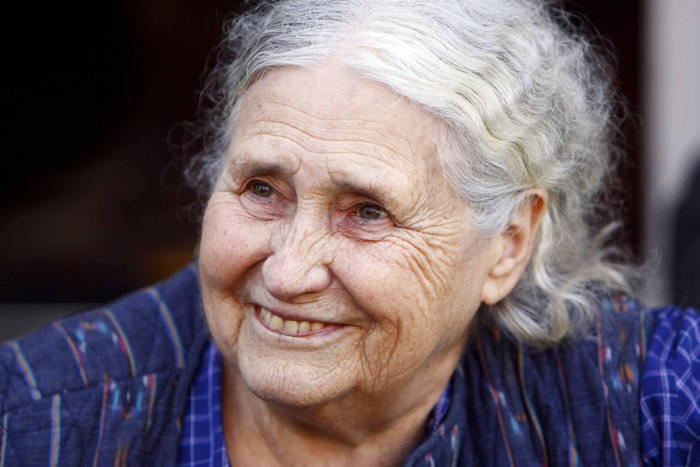
Doris Lessing (1919 – 2013) “was a British novelist, poet, playwright, librettist, biographer and short story writer. Her novels include The Grass is Singing (1950), the sequence of five novels collectively called Children of Violence (1952–69), The Golden Notebook (1962),” [and others]. Lessing was awarded the 2007 Nobel Prize in Literature… the eleventh woman and the oldest person ever to receive the Prize.” [Wikipedia]
From stressed childhoods to great writers
“The writers I know, or whose lives I have read about, have one thing in common: a stressed childhood. I don’t mean, necessarily, an unhappy one, but children who have been forced into self-awareness early, have had to learn how to watch the grown-ups, assess them, know what they really mean, as distinct from what they say, children who are continually observing everyone – they have had the best of apprenticeships.”
Doris Lessing – on britishcouncil.org page.
[Related article: Creative People, Trauma and Mental Health.]
~ ~ ~ ~
Lessing looked unflinchingly at society’s ills
Britain’s Lessing wins Nobel for literature [News story]
By Sarah Edmonds and Niklas Pollard Thu Oct 11, 12:11 PM ET
STOCKHOLM (Reuters) – British novelist Doris Lessing won the 2007 Nobel Prize for literature on Thursday for a body of work that looked unflinchingly at society’s ills and inspired a generation of feminist writers.
An epicist of the female experience
The Swedish Academy, which awards the 10 million crown ($1.54 million) prize, called the 87-year-old an “epicist of the female experience, who with skepticism, fire and visionary power has subjected a divided civilization to scrutiny.”
The oldest person to win a Nobel for literature, Lessing was only the 34th female laureate since the prizes began in 1901 and the 11th woman to take the literature award. …
Horace Engdahl, permanent secretary of the Swedish Academy, said Lessing’s work had been of great importance to other writers and to the broader field of literature.
“She has been a subject for discussion (by the academy) for quite some time, and now the moment was right. Perhaps we could say that she is one of the most carefully considered decisions in the history of the Nobel Prize,” he told Reuters after announcing Lessing had won.
“She has opened up a new area of experience that earlier had not been very accepted in literature. That has to do with, for instance, female sexuality.” ….
Early life
Lessing, born to British parents in what is now Iran on October 22, 1919, was raised in Southern Rhodesia, now Zimbabwe.
She went to a convent boarding school at the age of seven and later moved to a girls’ school in Salisbury, Rhodesia. After ending her formal schooling at 14, she worked variously as a nanny, telephonist, office worker and journalist.
Novels
Her debut as a novelist came in 1950 with “The Grass is Singing,” a book that examined the relationship between a white farmer’s wife and her black servant.
Her 1962 work “The Golden Notebook” was widely considered her breakthrough.
“The burgeoning feminist movement saw it as a pioneering work and it belongs to the handful of books that informed the 20th century view of the male-female relationship,” the academy said in its citation.
Lessing, who has never shrunk from controversy, said her next work — “Alfred and Emily” — was an anti-war book dedicated to her parents, whose lives were forever changed by World War One.
(Additional reporting by Georgina Prodhan in Frankfurt, Emma Bengtsson, Jerker Hellstrom, Adam Cox and Simon Johnson in Stockholm and Mike Collett-White in London)
Excerpted from a Reuters / Yahoo News story.
~ ~ ~
More perspectives of Lessing:
“Humanity’s legacy of stories and storytelling is the most precious we have. All wisdom is in our stories and songs. A story is how we construct our experiences. At the very simplest, it can be: ‘He/she was born, lived, died.’ Probably that is the template of our stories – a beginning, middle, and end. This structure is in our minds.” //
“I think a writer’s job is to provoke questions. I like to think that if someone’s read a book of mine, they’ve had – I don’t know what – the literary equivalent of a shower. Something that would start them thinking in a slightly different way, perhaps. That’s what I think writers are for.”
~ ~
Related article: Themes in the Lives of Successful U.S. Adult Creative Writers, by Jane Piirto, Ph.D. –
Also see other Writing articles.
~~~~~~~
Visited 1 times, 1 visit(s) today
* Note – Links to programs and products may be affiliate links, which means a company or publisher provides a small commission to me paid by them, if you decide to purchase. There is no extra cost to you. Commissions help support my efforts in creating the free content you read on my various sites, plus help pay for costs such as website hosting and software. As an affiliate for companies such as Sounds True, as well as a few coaches and psychologists, I provide links to programs that may be helpful for creative people. Thanks for reading articles – and for following these links.

